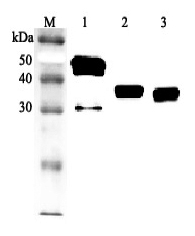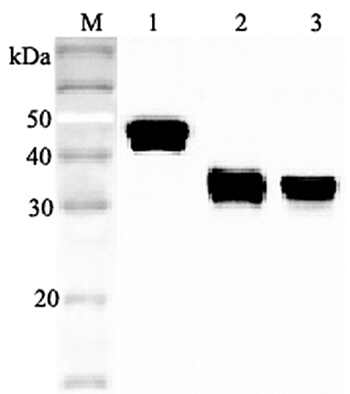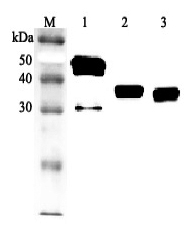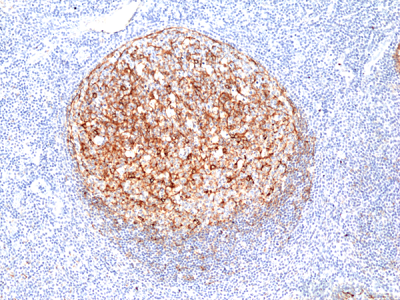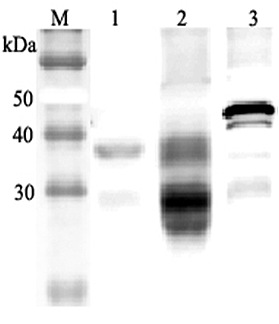
Western blot analysis using anti-Clusterin (mouse), pAb (Prod. No. AG-25A-0054) at 1:2000 dilution. 1: Mouse serum (2microl). 4: Mouse seminal plasma. 5: Mouse Clusterin (nuclear form) (His-tagged).
anti-Clusterin (mouse), pAb
AG-25A-0054
ApplicationsWestern Blot, ELISA
Product group Antibodies
ReactivityMouse
TargetClu
Overview
- SupplierAdipoGen Life Sciences
- Product Nameanti-Clusterin (mouse), pAb
- Delivery Days Customer10
- ApplicationsWestern Blot, ELISA
- CertificationResearch Use Only
- ClonalityPolyclonal
- Concentration1 mg/ml
- Gene ID12759
- Target nameClu
- Target descriptionclusterin
- Target synonymsApoJ, Cli, D14Ucla3, SP-40, Sgp-2, Sgp2, Sugp-2, clusterin, Apolipoprotein J, clustrin, complement lysis inhibitor, sulfated glycoprotein 2, testosterone repressed prostate message, testosterone repressed prostate message-2
- HostRabbit
- Protein IDQ06890
- Protein NameClusterin
- Scientific DescriptionClusterin shares homology with the small heat shock protein family of molecular chaperones. The mature secreted form of the protein is a glycosylated, 80-kDa disulfide-linked heterodimer of alpha and beta subunits (produced by internal cleavage). Clusterin is expressed in virtually all tissues and found in all fluids. It is involved in numerous physiological processes important for carcinogenesis and tumor growth, including apoptotic cell death, cell cycle regulation, DNA repair, cell adhesion, tissue remodeling, lipid transportation, membrane recycling, and immune system regulation. Clusterin also exists as a nuclear protein. The secreted form of Clusterin has extracellular chaperone and anti-apoptotic activities while the nuclear form acts as a proapoptotic factor. - Polyclonal Antibody. Recognizes mouse clusterin. Detects a band of ~48kDa by Western blot. Source: Rabbit. Applications: ELISA, WB. Liquid. 0.2microm-filtered solution in PBS, pH 7.4. Contains no preservatives. Clusterin shares homology with the small heat shock protein family of molecular chaperones. The mature secreted form of the protein is a glycosylated, 80-kDa disulfide-linked heterodimer of alpha and beta subunits (produced by internal cleavage). Clusterin is expressed in virtually all tissues and found in all fluids. It is involved in numerous physiological processes important for carcinogenesis and tumor growth, including apoptotic cell death, cell cycle regulation, DNA repair, cell adhesion, tissue remodeling, lipid transportation, membrane recycling, and immune system regulation. Clusterin also exists as a nuclear protein. The secreted form of Clusterin has extracellular chaperone and anti-apoptotic activities while the nuclear form acts as a proapoptotic factor.
- ReactivityMouse
- Storage Instruction-20°C,2°C to 8°C
- UNSPSC41116161



